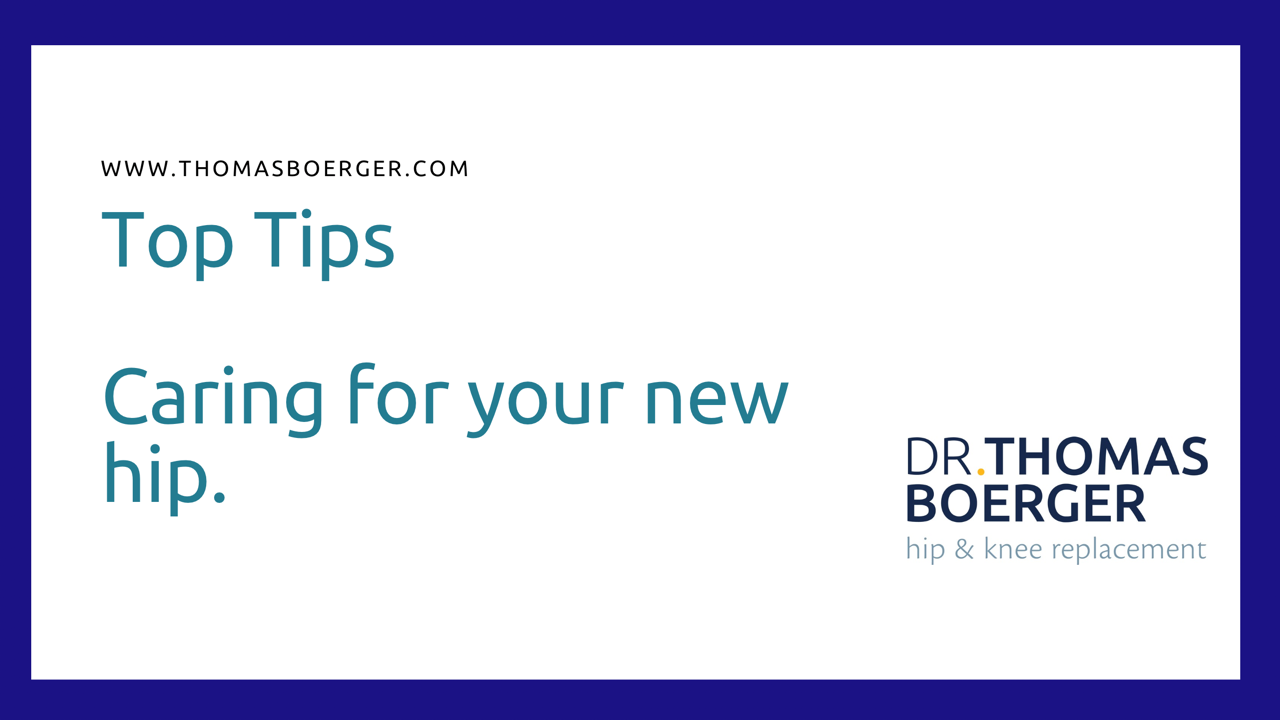
Expect advice from Dr. Thomas Boerger, MD FRCSI (Tr&Orth) Consultant Hip and Knee Surgeon, total hip replacement, as well as expert in partial knee replacement including CORI robotic assisted surgery.
Here Dr Thomas Boerger offers Essential Recovery Tips for Caring for Your New Hip Joint After Surgery
Recovering from hip replacement surgery requires careful attention to your environment, health, and daily routines. Here are tips to support your recovery process.
- Prepare Your Home for Recovery
Tip: Before your surgery, create a supportive living environment.
– Action: Enlist help from friends or family to rearrange your home, ensuring that essential items are easily accessible at waist level. This includes kitchen necessities like food and drink, as well as bathroom items.
– Additional Support: Organise assistance for household chores such as cooking and cleaning during your initial recovery weeks. Discuss arrangements with loved ones in advance.
- Plan for Time Off Work
Tip: Allow ample time for recovery before returning to work.
– Action: Discuss your rehabilitation timeline with your employer. Recovery typically takes up to three months, especially for physically demanding jobs.
– Flexible Options: Explore possibilities for remote work or modified duties to ease your transition back to your role.
- Balance Rest with Gentle Movement
Tip: Incorporate light activity into your daily routine.
– Action: Engage in short walks around your home and outdoors to promote circulation and prevent stiffness. Participate in supervised physiotherapy for tailored exercises.
– Caution: Avoid overexertion to prevent pain and setbacks in your recovery.
- Focus on Nutrition for Healing
Tip: Maintain a balanced diet to support recovery.
– Action: Include a variety of nutrients in your meals – proteins, carbohydrates, healthy fats, vitamins, and minerals – to aid your healing process.
– Weight Management: Avoid focusing on weight loss during your recovery; prioritise nourishing your body instead.
- Sleep and Self-Care Considerations
Tip: Establish good sleep habits to enhance recovery.
– Action: Sleep on your back or side, using a pillow between your legs for support. Avoid sleeping on your new hip or stomach.
– Movement Awareness: Be mindful of how you move – avoid crossing your legs or bending excessively at the waist.
Additional Self-Care Strategies
– Dressing: Sit down when getting dressed to prevent strain. Use assistive devices like a reacher or long-handled shoehorn to minimise bending.
– Sitting: Choose firm chairs with armrests, keeping your feet apart and avoiding leg crossing.
– Bathing: Use a non-slip mat and consider a shower chair for safety. Reach for items with long-handled tools to avoid bending.
- Transportation and Mobility
Tip: Ensure safe transportation practices.
– Action: Enter vehicles from street level and consider using a pillow for added height in the seat.
– Driving: Wait for your healthcare provider’s approval before driving, which will depend on your recovery progress.
- Walking Safely
Tip: Use mobility aids as recommended.
– Action: Rely on crutches or a walker until cleared by your doctor. Wear non-slip shoes to reduce the risk of falling.
– Caution: Be careful on wet or uneven surfaces and take small steps while turning to avoid losing balance.
By following these structured tips and being mindful of your body’s needs, you can enhance your recovery experience after hip replacement surgery.
Your journey to pain-free living starts here.
Marbella: Whatsapp +34 617 178 242
Gibraltar: Whatsapp +350 5407 4218
Email: info @ thomasboerger.com
I am Dr. Thomas Boerger, a Consultant Orthopaedic knee surgeon, expert in total knee replacement, partial knee replacement including robotic assisted surgery.
Specialist procedures include inside (Medial), outside (lateral) and knee cap (patello-femoral) Partial Knee Replacement, Total Knee Replacement, Total Hip Replacement and Knee Ligament Reconstruction.